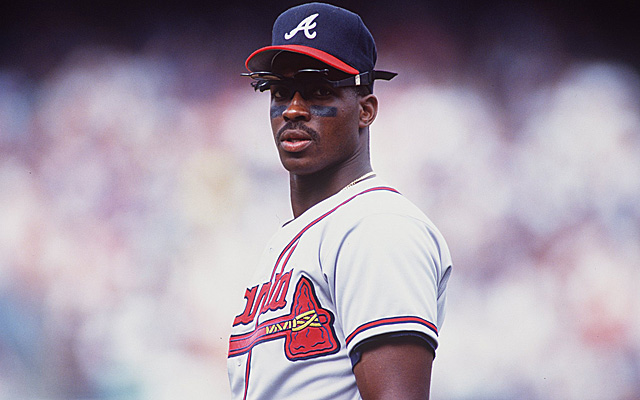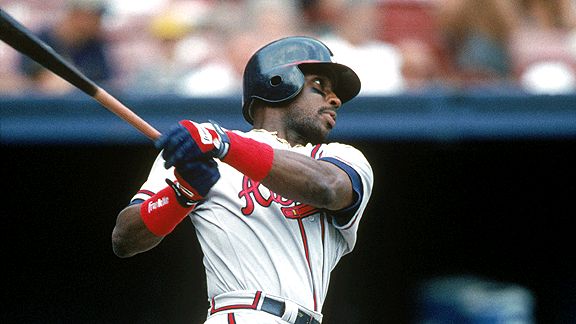 |
| The player's strike may have cost McGriff his chance at the HOF (CBS Sports) |
Let me explain. Of all the what ifs from that unfinished 1994 season--would Matt Williams have hit 62 home runs? Would Tony Gwynn have batted .400? Would Barry Bonds have gone 50/40? Would the Expos have won the World Series?--perhaps the biggest one revolves around Fred McGriff's Hall of Fame case; namely, how much better would it be? We can project with reasonable accuracy how he would have performed over the remainder of that season and at the beginning of the following one but what we can't know is how differently he'd be viewed today, if at all.
Because right now, at least, it's pretty clear that the BBWAA doesn't consider McGriff a Hall of Famer. He's never received 25 percent of the vote in any of his five years on the ballot, meaning he's never even received a third of the votes needed for Cooperstown. After polling below 12 percent last year, it's possible he falls below 5 percent this year and gets pushed off the ballot altogether--a victim of the recent over-abundance of Cooperstown-caliber candidates.
At this point it's better for McGriff to simply fall off the ballot, because he's clearly not going to get enshrined via the BBWAA. The sooner he's removed from the writer's ballot, the sooner his case can be heard by a Veteran's Committee, which hopefully will be more forgiving.
Because McGriff, at least in my eyes, is a worthy Hall of Famer, and he deserves to be recognized as such. His two most similar players are Willie McCovey and Willie Stargell, both of whom were enshrined a long time ago. His Hall of Fame monitor score is 100, and thus the score of a likely Hall of Famer.
There's no denying McGriff's massive counting numbers, either; the 493 home runs (same as Lou Gehrig!); the 1,550 RBI (more than Mickey Mantle!); the 2,490 hits (more than Frank Thomas). He's in the top-50 all-time in home runs, RBI, walks, extra base hits, total bases, and runs created. He's one of 17 players with at least 10,000 plate appearances and an OPS of .886 or higher. His .383 career wOBA is better than Al Kaline, Carl Yastrzemski, and Reggie Jackson. His 134 wRC+ exceeds that of Ken Griffey Jr., George Brett, and Dave Winfield. Granted, none of those men were primarily first basemen, but the point is that McGriff was on their level as hitters. It takes a special player to hit so well for so long, and McGriff was one such player.
The downside is that, much like contemporaries Craig Biggio and Rafael Palmeiro, McGriff is seen as a compiler--a player with many good seasons but no great seasons. He's something of a modern-day Tony Perez in this regard, which is no knock on him. Perez is a Hall of Famer, albeit on the lower end of the first base spectrum, but a Hall of Famer all the same. McGriff is immediately below Perez in the positional JAWS rankings, for their careers were of near-identical value. If one considers Big Dog Cooperstown-worthy, than he must also consider Crime Dog worthy as well.
Still, I can't help but wonder how the perception of McGriff would have changed had he merely been allowed to play full seasons in 1994 and 1995. The knock on McGriff, after all, is that he never had that one signature season where it all came together for him. In fact, he did have one of those seasons: it just happened to be 1994.
 |
| McGriff might have gone yard 50 times in '94 if not for the strike (ESPN) |
Alas, we'll never know. August was shaping up to be his best month of the season by far, and who knows how he would have fared in September? Given how well he was hitting at the time and how well he had performed up to that point, something tells me he would have done just fine. With 34 home runs and 94 RBI at the break he was a lock to exceed 40 and 110 for the first time. His OPS was over 1.000 at the time, and he had an outside shot at 50 big flies and 200 hits. With Jeff Bagwell possibly finished for the year with a broken hand, McGriff may have walked away with MVP honors, especially if his hot stick had been able to propel second-place Atlanta past Montreal in the NL East (the Braves were six games out of first with 48 left to play). As it were, he finished eighth--his sixth straight year in the top-10.
McGriff had only missed one of Atlanta's first 114 games, so using his 162 game projection should give a reasonable approximation of his final numbers. Those are 116 runs, 193 hits, 35 doubles, 48 homers, 134 ribbies, 10 steals, 71 walks, and 378 total bases, which are absolutely monstrous. Thus, we must add 35 runs, 58 hits, 10 doubles, 14 homers, 40 RBI, 21 walks, and 114 total bases to his final ledger.
The strike carried over into 1995, delaying the start of the season by about three weeks. The late start didn't prevent McGriff from having another All-Star season, though. He slugged 27 home runs, knocked in 93 runs, put up an .850 OPS, and didn't miss a game. Give him 18 more games, and he probably reaches 30 home runs and doubles, surpasses 100 RBI, and approaches 100 runs as well as 300 total bases. Projecting his '95 production over 162 games adds 10 runs, 18 hits, three doubles and homers, 11 RBI, 32 total bases, and eight walks to his final line.
Giving McGriff full credit for his 1994-95 performances significantly changes not only his career totals, but also the complexion of his resume. He now has 11 30-homer seasons instead of 10, and one 40-homer season instead of none. The extra 30-homer season makes a difference, as there are only 14 players to top 30 dingers 11 times. Players with 11 such seasons include Willie Mays, Frank Robinson, Mark McGwire, Sammy Sosa, and Carlos Delgado. McGriff also has 10 years with at least 100 RBI instead of eight, including six straight from 1991-'96. That would give him as many 100 RBI seasons as Stan Musial, Willie Mays, Hank Aaron, Joe Carter, and Rafael Palmeiro. Only 16 players in baseball history have ever had that many.
As for his final numbers, McGriff would have wound up with roughly:
-1,394 runs
-2,566 hits
-454 doubles
-510 home runs
-1,601 RBI
-1,334 walks
-4,604 total bases
Those numbers, while marginally better, smell more like those of a Hall of Famer (a lot like Ernie Banks's actually). He's in the 500 home run club, exceeds 1,600 RBI, and is closer to 2,600 hits than 2,500. Just giving him that extra half-season back makes a big difference. When you're on the cusp, marginal improvements make all the difference.
If those were McGriff's final numbers, would he be in the Hall of Fame? I'm not sure. My gut tells me no, given the stiff competition and how poorly players with much better numbers have fared (though they also have PED suspicions, which thankfully have never tainted McGriff). At the very least, he wouldn't be in danger of falling off the ballot. His case would be harder to dismiss, and he wouldn't be just a fringe candidate or an afterthought to most voters. He'd have a real chance.
Hopefully someday, he'll get the plaque he deserves.
No comments:
Post a Comment